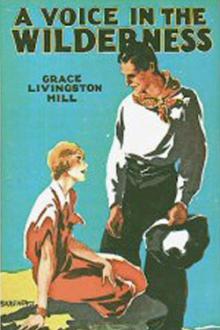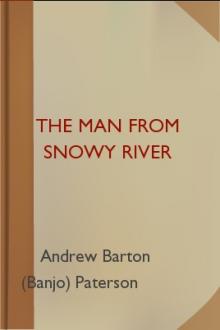The Gringos<br />A Story Of The Old California Days In 1849, B. M. Bower [cheapest way to read ebooks TXT] 📗

- Author: B. M. Bower
Book online «The Gringos<br />A Story Of The Old California Days In 1849, B. M. Bower [cheapest way to read ebooks TXT] 📗». Author B. M. Bower
And, he owned to himself, Jack was unconscious of any hurt for his friend in this rather transparent wooing. A little thought would have enlightened him, perhaps, or a little observation; but Dade could not blame Jack for not seeking for some obstacle in the path of his desires.
"She says I'm lazy and got these callouses grabbing the soft snaps last summer in the mines," Jack called lightly, when finally it occurred to him that the world held more than two persons. "I'm always getting the worst of it when you and I are compared. But I believe I've got the best of you on riding outfit, old man. Take a look at that saddle, will you! And these spurs! And this bridle! The señorita says the cattle will fall on their knees when I ride past; we're going to take a gallop and find out. Want to come along?"
"Arrogant one! The señorita did not agree to that ride! The señorita has something better to do than bask in the glory of so gorgeous a señor while he indulges his vanity—and frightens the poor cattle so that, if they yield their hides at killing time, there will be little tallow for the ships to carry away!"
The Señorita Teresita would surely never be guilty of a conscious lowering of one eyelid to point her raillery, but the little twist she gave to her lips when she looked at Dade offered a fair substitute; and the flirt of her silken skirts as she turned to run back into the house was sufficient excuse for any imbecility in a man.
Jack looked after her with some chagrin. "The little minx! A man might as well put up his hands when he hears her coming—huh? Unless he's absolutely woman-proof, like you. How do you manage it, anyway?"
"By taking a squint at myself in the looking-glass every morning." Dade's face managed to wrinkle humorously. "H-m. You are pretty gorgeous, for a fact. Where's the riata?"
Jack had forgotten that he had ever wanted one. He lifted the heavy, high-cantled saddle, flung it down upon the other side and untied the new coil of braided rawhide from its place on the right fork.
"A six-strand, eh? I could tell Manuel a few things about riatas, if he calls that the best! Four strands are stronger than six, any time. I've seen too many stranded—"
"The señor is not pleased with the riata?"
Manuel, following Don Andres across to the veranda, had caught the gesture and tone; and while his knowledge of English was extremely sketchy, he knew six and four when he heard those numerals mentioned, and the rest was easy guessing.
"The four strands are good, but the six are better—when Joaquin Murieta lays the strands. From the hide of a very old bull was this riata cut; perhaps the señor is aware that the hide is thus of the same thickness throughout and strong as the bull that grew it. Not one strand is laid tighter than the other strand; the wildest bull in the valley could not break it—if the señor should please to catch him! Me, I could have bought three riatas for the gold I gave for this one; but the señor told me to get the best." His shoulders went up an inch, though Don Andres was frowning at the tone of him. "The señor can return it to the Mission and get the three, or he can exchange it with any vaquero in the valley for one which has four strands. I am very sorry that the señor is not pleased with my choice."
"You needn't be sorry. It's a very pretty riata, and I have no doubt it will do all I ask of it. The saddle's a beauty, and the bridle and spurs—I'm a thousand times obliged."
"It is nothing and less than nothing," disclaimed Manuel once more; and went in to ask the señora for a most palatable decoction whose chief ingredient was blackberry wine, which the señora recommended to all and sundry for various ailments. Though Manuel, the deceitful one, had no ailment, he did have a keen appreciation of the flavour of the cordial, and his medicine bottle was never long empty—or full—if he could help it.
A moment later Jack, hearing a human, feminine twitter from the direction of the rose garden, left off examining pridefully his belongings, and bolted without apology, after his usual headlong fashion.
Don Andres sat him down in an easy-chair in the sun, and sighed as he did so. "He is hot-tempered, that vaquero," he said regretfully, his mind upon Manuel. "Something has stirred his blood; surely your friend has done nothing to offend him?"
"Nothing except remark that he has always liked a four-strand riata better than six. At the hut he was friendly enough."
"He is not the only one whose anger is easily stirred against the gringos," remarked the don, reaching mechanically for his tobacco pouch, while he watched Dade absently examining the new riata.
"Señor Hunter," Don Andres began suddenly, "have you decided what you will do? Your mine in the mountains—it will be foolish to return there while the hands of the Vigilantes are reaching out to clutch you; do you not think so? More of the tale I have heard from Valencia, who returned with Manuel. Those men who died at the hand of your friend—and died justly, I am convinced—had friends who would give much for close sight of you both."
"I know; I told Jack we'd have to keep away from town or the mine for a while. He wanted to go right back and finish up the fight!" Dade grinned at the absurdity. "I sat down hard on that proposition." Not that phrase, exactly, did he use. One may be pardoned a free translation, since, though he spoke in excellent Spanish, he did not twist his sentences like a native, and he was not averse to making use of certain idioms quite as striking in their way as our own Americanisms.
Don Andres rolled a cigarette and smoked it thoughtfully. "You were wise. Also, I bear in mind your statement that you could not long be content to remain my guest. Terribly independent and energetic are you Americanos." He smoked through another pause, while Dade's puzzled glance dwelt secretly upon his face and tried to read what lay in his mind. It seemed to him that the don was working his way carefully up to a polite hint that the visit might be agreeably terminated; and his uneasy thoughts went to the girl. Did her father resent—
"My majordomo," the don continued, just in time to hold back Dade's hasty assurance that they would leave immediately, "my majordomo does not please me. Many faults might I name, sufficient to make plain my need for another." A longer wait, as if time were indeed infinite, and he owned it all. "Also I might name reasons for my choice of another, who is yourself, Señor Hunter. Perhaps in you I recognize simply the qualities which I desire my majordomo to possess. Perhaps also I desire that some prejudiced countrymen of mine shall be taught a lesson and made to see that not all Americanos are unworthy. However that may be, I shall be truly glad if you will accept. The salary we will arrange as pleases you, and your friend will, I hope, remain in whatever capacity you may desire. Further, when your government has given some legal assurance that my land is mine," he smiled wrily at the necessity for such assurance, "as much land as you Americanos call a 'section,' choose it where you will—except that it shall not take my house or my cultivated land—shall be yours for the taking."
"But—"
"Not so much the offer of a position would I have you consider it," interrupted the other with the first hint of haste he had shown, "as a favor that I would ask. Times are changing, and we natives are high-chested and must learn to make room for others who are coming amongst us. To speak praises to the face of a friend is not my habit, yet I will say that I would teach my people to respect good men, whatever the race; and especially Americanos, who will be our neighbors henceforth. I shall be greatly pleased when you tell me that you will be my majordomo; more than ever one needs a man of intelligence and tact—"
"And are none of our own people tactful or intelligent, Don Andres Picardo?" demanded Manuel, having overheard the last sentence or two from the doorway. He came out and stood before his beloved "patron," his whole fat body quivering with amazed indignation, so that the bottle which the señora had filled for him shook in his hand. "Amongst the gringos must you go to find one worthy? Truly it is as Don José tells me; these gringos have come but to make trouble where all was peace. To-day he told me all his thoughts, and me, I hardly believed it was as he said. Would the patron have a majordomo who knows nothing of rodeos, nothing of the cattle—"
"You're mistaken there, Manuel," Dade broke in calmly. "Whether I become majordomo or not, I know cattle. They have a few in Texas, where I came from. I can qualify in cowology any time. And," he added loyally, "so can Jack. You thought he didn't know what he was talking about, when he was looking at that riata; but I'll back him against any man in California when it comes to riding and roping.
"But that needn't make us bad friends, Manuel. I didn't come to make trouble, and I won't stay to make any. We've been friends; let's stay that way. I'm a gringo, all right, but I've lived more with your people than my own, and if you want the truth, I don't know but what I feel more at home with them. And the same with Jack. We've eaten and slept with Spaniards and worked with them and played with them, half our lives."
"Still it is as José says," reiterated Manuel stubbornly. "Till the gringos came all was well; when they came, trouble came also. Till the gringos came, no watch was put over the cattle, for only those who hungered killed and ate. Now they steal the patron's cattle by hundreds, they steal his land, and if José speaks truly, they would steal also—" He hesitated to speak what was on his tongue, and finished lamely: "what is more precious still.
"And the patron will have a gringo for majordomo?" He returned to the issue. "Then I, Manuel, must leave the patron's employ. I and half the vaqueros. The patron," he added with what came close to a sneer, "had best seek gringo vaqueros—with the clay of the mines on their boots, and their red shirts to call the bulls!"
"I shall do what it pleases me to do," declared the don sternly. "Advice from my vaqueros I do not seek. And you," he said haughtily, "have choice of two things; you may crave pardon for your insolence to my guest, who is also my friend, and who will henceforth have charge of my vaqueros and my cattle, or you may go whither you will; to Don José Pacheco, I doubt not."
He leaned his white-crowned head against the high chair-back, and while he waited for Manuel's decision he gazed calmly at the border of red tiles which showed at the low eaves of the porch—calmly as to features only, for his eyes held the blaze of anger.
"Señors, I go." The brim of Manuel's sombrero flicked the dust of the patio.
"Come, then, and I will reckon your wage," invited the don, coldly courteous as to a stranger. "You will excuse me, Señor? I shall not be long."
Dade's impulse was to protest, to intercede, to say that he and Jack would go immediately, rather than stir up strife. But he had served a stern apprenticeship in life, and he knew it was too late now to put out the fires of wrath burning hotly in the hearts of those two; however completely he might efface himself, the resentment was too keen, the quarrel too fresh to be so easily forgotten.
He was standing irresolutely on the steps when Jack came hack from the rose garden, whistling softly an old love-song and smiling fatuously to himself.
"We're going to take that ride, after all," he announced gleefully. "Want to come along? She's going to ask her father to come, too—says it would be terribly improper for us two to ride alone. What's the matter? Got the toothache?"
Dade straightened himself automatically after the slap on the back that was like a cuff from a she-bear, and grunted an uncivil sentence.
"Come over to the saddle-house," he commanded afterward. "And take that truck off the señora's front steps before she sees it and has a fit. I want to talk to you."
"Oh, Lord!" wailed Jack, under his breath, but he shouldered the heavy saddle obediently, leaving Dade to





Comments (0)